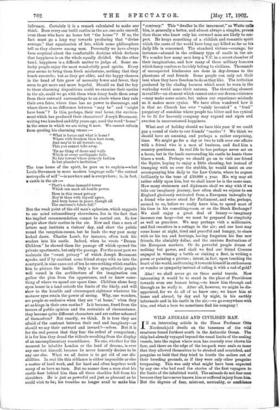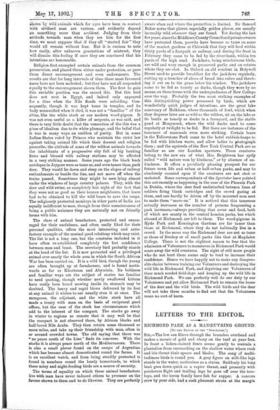WILD ANIMALS AND CIVILISED MAN
IN an interesting article in the Times Professor. Otto Nordenskjold dwells on the tameness of the wild creatures found furthest south in the Antarctic Ocean. The ship had already voyaged beyond the usual limits of the sealing vessels, into the region where man has scarcely ever shown his face, and there on the edge of the ice-pack were seals so tame that they allowed themselves to be stroked and scratched, and penguins so bold that they tried to hustle the sailors out of their breeding grounds, as if they were only other penguins trespassing. This was only what might have been expected by any one who had read the stories of the first voyagers to the limits of the inhabited world. The animals do not fear man because they have never known him or suffered injury from hint. But the degrees of fear, mistrust, neutrality, or cenfidence *aliown by wild animals which for ages have been in contact with civilised man are various, and evidently depend On something more than accident. Judging from their attitude, towards man when they see him for the first time, *6 must suppose that if they all " started fair" they would all remain without fear. But it is curious to note bow easily, after unknown generations of mistrust, they will dismiss this feeling if once they are convinced that his intentions ars honourable.
Religion first exempted certain animals from the common persecution, and placed them either under protection, or gave them direct encouragement and even endowments. The results are that for long intervals of time these most favoured races have not been molested ; but they have not all responded equally to the encouragement shown them. The first to gain this enviable position was the sacred ibis. But this bird does not nest in Egypt, and indeed only appeared for a time when the Nile floods were subsiding. Con- sequently, though it was kept tame in temples, and its body mummified when it died, it was not a "familiar" of the cities, like the white stork or our modern wood-pigeon. It was not even useful as a killer of serpents, as was said, and there is very little doubt that the veneration of the ibis was a piece of idealism due to its white plumage, and the belief that it was in many ways an emblem of purity. But in some Indian States ruled by Princes who maintain the strict law against taking animal life which their descent and religion prescribe, the attitude of some of the wildest animals towards the inhabitants of a progressive city full of big banking firms and blessed with railway stations may be affected in a very striking manner. Some years ago the black buck antelopes in Jeypore were as tame as, and even tamer than, park deer. They would lie down and sleep on the slopes of railway embankments or beside the line, and not move off when the trains passed. Sometimes they might be seen lying almost under the windows of large country palaces. They, with the deer and wild swine, so completely lost sight of the fact that they were not as good as their human neighbours, that leave had to be obtained to kill the wild boars to save the crops. The religiously.protected monkeys in other parts of India are equally indifferent to man, though from their consciousness of being a public nuisance they are naturally not on friendly terms with him.
The class of animal benefactors, protected and encou- raged for their usefulness, and often really liked for their personal qualities, offers the most interesting and satis- factory example of the mutual good relationp which may exist. The list is not a long one, but the creatures included in it have often re-established completely the lost confidence between man and beast. The secretary bird probably stands at the head of the list. It is now protected and a privileged animal over nearly the whole area in which the South African War has been carried on. It is a wild bird, though the young are often brought up at farmhouses, and is found north- wards as far as Khartoum and Abyssinia. Its boldness and familiar ways are the subject of stories too familiar to need quoting, though whether newly swallowed kittens have really been heard mewing inside its stomach may be doubted. The heavy and rapid blows delivered by its feet at any animal it wishes to eat usually stun it at once. The mongoose, the adjutant, and the white stork have all made a treaty with man on the basis of reciprocal good offices, but the case of the stork has circumstances which add to the interest of the compact. The storks go away in winter to regions so remote that it may well be that the compact is not observed there, by African blacks and half-breed Nile Arabs. They then return some thousand or more miles, and take up their friendship with man, often in or around crowded towns. The old saying that there was "no peace south of the Line " finds its converse. With the storks it is always peace north of the Mediterranean. There is also a small plover found on the campa of Argentina which has become almost domesticated round the farms. It is an excellent watch, and from being steadily protected is found in numbers round the lonely homesteads, to which these noisy and night-feeding birds are a source of security.
The terms of equality on which these animal benefactors live with man have never induced others to presume on the favour shown to them and to do likewise. They are perfectly aware when and where the protection is limited. Sir Samuel Baker notes that plover, especially golden plover, are usually incurably wild wherever they are found. Yet during the last few years, since the Middlesex County Council and private owners have protected them, peewits have become so tame on some of the market gardens at Chiswick that they will feed within thirty yards of a footpath or railway, and during the frost in February they came to be fed by the river-bank, within ten yards of the high road. Jackdaws, being mischievous birds, are wild and wary enough in preserved parks, and on estates where they are shot. In Oxford an old resident in Holywell Street used to provide breakfast for the jackdaws regularly, cutting up a trencher of slices of bread into cubes and throw- ing it out on to the grass below his window. The jackdaws came to be fed as tamely as ducks, though they were by no means on these terms with the undergraduates of New College over the way. Probably the two most striking examples of this distinguishing power possessed by birds, 'which are wonderfully quick judges of intentions, are the great lake sanctuary of Holkham, where thousands of fowl, which when they disperse later are as wild as the wildest, sit on the lake or its banks as tamely as ducks in a farmyard, and the stable pond at Monymusk, where the wild ducks used to come regularly at twilight to be fed. But there are instances of the tameness of mammals even more striking. Certain bears in the Yellowstone Park come to the hotel rubbish-heaps to be fed with kitchen waste, and allow ladies to photograph them ; and the squirrels of the New York Central Park are as familiar as are our London sparrows. These creatures belong to the new era of what Mrs. Brightwen has aptly called " wild nature won by kindness," or by absence of un- kindness. It offers a peculiarly pleasing prospect for our future town life and urban or half-urban parks, and may be absolutely counted upon if the creatures are not shot or molested. Some correspondents of the Spectator have pointed this out recently as happening in the case of the Phoenix Park in Dublin, where the deer feed undisturbed between lines of soldiers firing blank cartridges and the crowd gazing at them, and can hardly be driven off by the mounted men sent to make them " move on." It is noticed that this tameness actually increases as the number of persons frequenting a park increases,—always providing that cover and food, both of which are scanty in the central London parks, but which abound at Richmond, are left to them. The wood-pigeons in Hyde Park and Kensington Gardens are far tamer than those at Richmond, where they do not habitually live in a crowd. In the same way the Richmond deer are not so tame as those of Bushey or of small parks like that at Magdalen College. There is not the slightest reason to fear that the admission of Volunteers to manoeuvre in Richmond Park would scare away the wild creatures. The sight of still more people who do not hurt them seems only to tend to increase their confidence. Hence we have happily not to make any disagree- able choice between training our Volunteers and destroying the wild life in Richmond Park, and depriving our Volunteers of their much needed field-days and keeping up the wild life in Richmond Park. We can perfectly well do our duty by our Volunteers and yet allow Richmond Park to remain the home of the deer and the wild birds. The wild birds and the deer will not take three months to find out that the Volunteers mean no sort of harm.







































 Previous page
Previous page